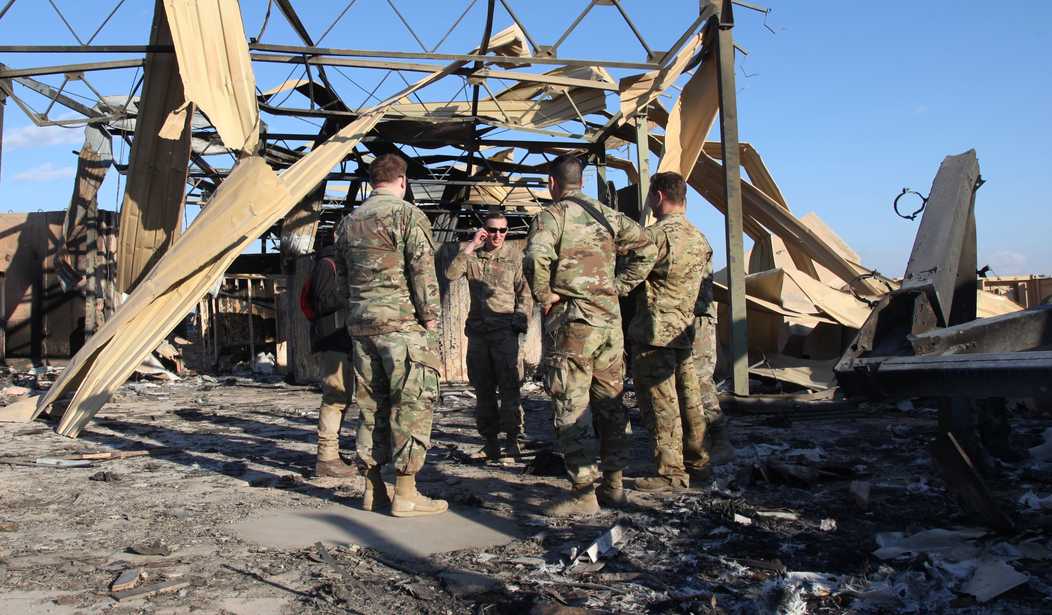President Trump shocked the world — and mortified Democrats — when he authorized a lethal drone strike against Iranian General and super-terrorist Qassem Soleimani. The real surprise, however, wasn't that Trump suddenly found the gumption to target a high-profile Iranian — it was that it took America so long to rid the world of a man with so much American blood on his hands. Previous U.S. administrations, afraid of “escalation,” allowed the agents of Iran free rein in their murderous plots. Sooner or later, America had to push back.
What's odd, though, is that the entirely justifiable U.S. strike on Soleimani produced, in turn, a direct Iranian missile strike on two U.S. bases in Iraq. President Trump warned before these strikes occurred that America would not tolerate aggression against our servicemen and assets in the region — and a broad list of targets in Iran had been identified for potential retaliatory action.
The Iranians chose to avenge Soleimani in a particularly bold and provocative way. They launched ballistic missiles from Iran itself, targeting bases in Iraq where large numbers of U.S. servicemen are stationed. Iran could have used Iraqi proxies to do its dirty work; it could have attacked Israel or our allies in Iraq instead of U.S. soldiers. Instead it decided to go all out by mounting a direct assault on American personnel that left no doubt about who was responsible.
The missile strikes against two U.S. bases, as it happened, killed no U.S. servicemen. That is largely because Americans were able to take shelter as the missiles rained down. As recent reporting has shown, however, some soldiers were lightly injured by the concussive effects of the blasts.
President Trump chose to let sleeping dogs lie after the Iranian attack. He declared the cycle of retaliation complete, and he cheered the fact that Iran appeared to be “standing down”.
Given the apocalyptic reporting in the news media in the preceding days about an imminent “war” with Iran, Trump's restraint must have come as a surprise to Democrats and Trump haters. That Trump eschews involvement in foreign conflicts, however, has been obvious for a long time. Trump is willing to break the rules of diplomacy, yes, and even to use military force in unconventional ways, but he seemingly has no appetite for major military confrontations, and in fact he has been trying, with limited success, to disengage the United States from the grinding conflicts to which it is already committed, like the Syrian Civil War and the War in Afghanistan.
Recommended
What ought to give the American people pause, however, is the strange precedent that President Trump has now set vis-a-vis foreign aggression. He punished Iran with lethal force for, as the administration described it, formulating plans to attack U.S. assets. When the Iranians directly assaulted U.S. bases, however, he demurred from retaliation.
What is the lesson here that Iran is supposed to learn? That the contemplation of terrorist acts against Americans may provoke us to violence, but the actual lobbing of sophisticated missiles at our bases, with the potential to kill dozens or hundreds of Americans, will only yield a yawn and a shrug?
If anything, it would seem that Iran's missile strikes were what demanded a resolute response. Our failure to deliver it could embolden Iran, and other hostile actors around the world, to target U.S. military personnel and bases directly. The results could be tragic, on a human level, and deeply destabilizing on a political and strategic level, since a successful assault on American personnel would presumably produce a whirlwind of violent consequences.
The time for retaliation in the wake of Iran's dastardly missile strikes has now passed. Unfortunately, that means that President Trump missed a crucial opportunity to demonstrate his seriousness about fulfilling his No. 1 responsibility as commander in chief: the protection of U.S. lives from foreign aggression.
We can only hope that this oversight does not put more of our servicemen in harm's way.

























Join the conversation as a VIP Member